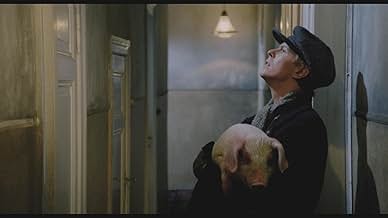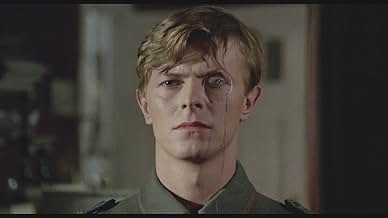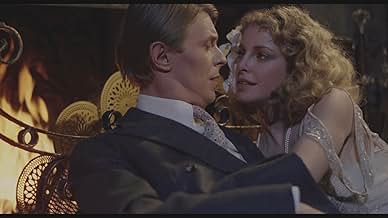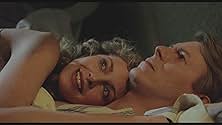CALIFICACIÓN DE IMDb
5.4/10
1.2 k
TU CALIFICACIÓN
Agrega una trama en tu idiomaAfter World War I, a war hero returns to Berlin to find that there's no place for him--he has no skills other than what he learned in the army, and can only find menial, low-paying jobs. He ... Leer todoAfter World War I, a war hero returns to Berlin to find that there's no place for him--he has no skills other than what he learned in the army, and can only find menial, low-paying jobs. He decides to become a gigolo to lonely rich women.After World War I, a war hero returns to Berlin to find that there's no place for him--he has no skills other than what he learned in the army, and can only find menial, low-paying jobs. He decides to become a gigolo to lonely rich women.
Evelyn Künneke
- Frau Aeckerle
- (as Evelyn Künnecke)
Bela Ernyey
- Von Lipzig
- (as Bela Erny)
Argumento
¿Sabías que…?
- TriviaThe last on-screen appearance by Marlene Dietrich. German press reports claimed she was paid $250,000 for two days' work.
- Créditos curiosos"And featuring, with great pride, MARLENE DIETRICH"
- Versiones alternativasThe original European version ran a full 147 minutes. The U.S. version was cut to 105 minutes. Only this version is available on video (Water Bearer Films Video) in the United States.
- ConexionesFeatured in Marlene (1984)
- Bandas sonorasJust a Gigolo
(Schöner Gigolo, armer Gigolo)
Music by Leonello Casucci
German lyrics by Julius Brammer
English lyrics by Irving Caesar
Sung by Marlene Dietrich
Opinión destacada
David Bowie stars this unusual melodrama set after World War I, a war hero , Army Lietenant, goes back to Berlin to find that there's no place for him, as he has no skills other than what he learned in the army, and can only find menial, low-paying jobs. He decides to become a gigolo to lonely wealthy women. As he spends most of his time working for the sexiest of ladies.
It is a mediocre film from Columbia Pictures with splendid cast that although in the technical sections: photography, music, costumes, coloring are quite good, it suffers from slowness, interference and confusion. It displays a lot of most expensive sets ever made in Germany to date, restoring some footage originally deleted by the producer Rolf Thiele, who radically reduced its 147 minutes running time after preliminary screenings. These alterations may well have helped, but no amount of tinkering could turn it into the comedy-drama that it was clearly intented to be. Its main problem is its tone, dealing with the story of a young Prussian returning to a turbulent Berlin after WWWI and finding himself torn between a number of successive lovers, homosexual Nazis, a group of gigolos and a flotilla of rich widows, but it never finds its nivel, swinging wildly between coarse knockabout farce and aspirations to tragic dignity. At the beginning there is a good recreation of the trenches during the First World War, and later there are some brief atmospheric descriptions of the German social situation during the failed Weimar Republic with the rise of the 'brownshirts' commanded by Ernst Rohm. But the film gets lost in different twists and turns in which our protagonist interacts with various women such as the dancer and singer Sydne Rome who's actually the attractive co-starring proving like never before that she is a good actress, singer and dancer; furthermore, the still charming widow Kim Novak, the gigolos-madam Marlene Dietrich, his mother played by Maria Schell who cleans the Berlin baths, among others. This film was about Berlin, shot in Berlin and financed partly by Berlin. However, none of the principal cast were from Berlin except for Marlene Dietrich in her last on-screen appearance, who was a native Berliner in self-imposed exile, in fact she shot in Paris but montage makes her seem to be in Berlin with David Bowie. Bowie's vacant acting reflects these uncertainties precisely and the cluster of star names around him are reduced to delivering awkward party pieces, these notorious players include as follows : Kim Novak, Maria Schell, David Hemmings, Maria Schell, Curd Jürgens and brief appearances from slighly known German actors, such as: Erika Pluhar, Hilde Weissner, Werner Pochath, Gunter Meisner, Reinhard Kolldehoff and 'with pride' Marlene Dietrich.
The motion picture was regularly and slowly directed by David Hemmings. This prestigious actor and directed -dead at 62- played some famous films: Alfred the Great, Blow-up, Profondo rosso, Barbarella, Camelot. And also directed some pictures with limited success. Hemmings made two Australian theatrical feature films in the early 1980s , the first was The survivor (1981) and followed by Race for the Yankee Zephyr (1981). This was last cinema movie directed by David Hemmings for around eleven years until 1992's Dark Horse (1992). Both films were made with producer Antony I. Ginnane and both movies featured an airplane as a central story element and David Hemmings replaced Richard Franklin as director. Hemmings' only other theatrical feature after that movie was 1996's Lone Justice 3 (1996). In between these pictures Hemmings did direct in television various episodes of popular TV series, such as: A Team (1983), Airwolf (1984), Magnum P. I. (1980) and Quantum Leap (1989). Rating: Average, 4.5/10. Only for David Bowie fans.
It is a mediocre film from Columbia Pictures with splendid cast that although in the technical sections: photography, music, costumes, coloring are quite good, it suffers from slowness, interference and confusion. It displays a lot of most expensive sets ever made in Germany to date, restoring some footage originally deleted by the producer Rolf Thiele, who radically reduced its 147 minutes running time after preliminary screenings. These alterations may well have helped, but no amount of tinkering could turn it into the comedy-drama that it was clearly intented to be. Its main problem is its tone, dealing with the story of a young Prussian returning to a turbulent Berlin after WWWI and finding himself torn between a number of successive lovers, homosexual Nazis, a group of gigolos and a flotilla of rich widows, but it never finds its nivel, swinging wildly between coarse knockabout farce and aspirations to tragic dignity. At the beginning there is a good recreation of the trenches during the First World War, and later there are some brief atmospheric descriptions of the German social situation during the failed Weimar Republic with the rise of the 'brownshirts' commanded by Ernst Rohm. But the film gets lost in different twists and turns in which our protagonist interacts with various women such as the dancer and singer Sydne Rome who's actually the attractive co-starring proving like never before that she is a good actress, singer and dancer; furthermore, the still charming widow Kim Novak, the gigolos-madam Marlene Dietrich, his mother played by Maria Schell who cleans the Berlin baths, among others. This film was about Berlin, shot in Berlin and financed partly by Berlin. However, none of the principal cast were from Berlin except for Marlene Dietrich in her last on-screen appearance, who was a native Berliner in self-imposed exile, in fact she shot in Paris but montage makes her seem to be in Berlin with David Bowie. Bowie's vacant acting reflects these uncertainties precisely and the cluster of star names around him are reduced to delivering awkward party pieces, these notorious players include as follows : Kim Novak, Maria Schell, David Hemmings, Maria Schell, Curd Jürgens and brief appearances from slighly known German actors, such as: Erika Pluhar, Hilde Weissner, Werner Pochath, Gunter Meisner, Reinhard Kolldehoff and 'with pride' Marlene Dietrich.
The motion picture was regularly and slowly directed by David Hemmings. This prestigious actor and directed -dead at 62- played some famous films: Alfred the Great, Blow-up, Profondo rosso, Barbarella, Camelot. And also directed some pictures with limited success. Hemmings made two Australian theatrical feature films in the early 1980s , the first was The survivor (1981) and followed by Race for the Yankee Zephyr (1981). This was last cinema movie directed by David Hemmings for around eleven years until 1992's Dark Horse (1992). Both films were made with producer Antony I. Ginnane and both movies featured an airplane as a central story element and David Hemmings replaced Richard Franklin as director. Hemmings' only other theatrical feature after that movie was 1996's Lone Justice 3 (1996). In between these pictures Hemmings did direct in television various episodes of popular TV series, such as: A Team (1983), Airwolf (1984), Magnum P. I. (1980) and Quantum Leap (1989). Rating: Average, 4.5/10. Only for David Bowie fans.
- ma-cortes
- 4 dic 2023
- Enlace permanente
Selecciones populares
Inicia sesión para calificar y agrega a la lista de videos para obtener recomendaciones personalizadas
- How long is Just a Gigolo?Con tecnología de Alexa
Detalles
- Fecha de lanzamiento
- País de origen
- Idiomas
- También se conoce como
- Just a Gigolo
- Locaciones de filmación
- Productoras
- Ver más créditos de la compañía en IMDbPro
- Tiempo de ejecución2 horas 27 minutos
- Mezcla de sonido
- Relación de aspecto
- 1.66 : 1
Contribuir a esta página
Sugiere una edición o agrega el contenido que falta

Principales brechas de datos
By what name was Schöner Gigolo, armer Gigolo (1978) officially released in India in English?
Responda
































